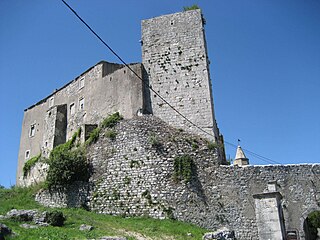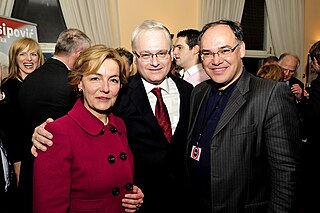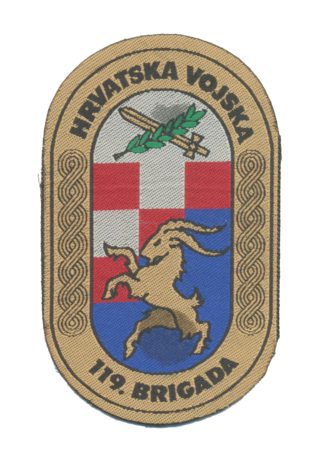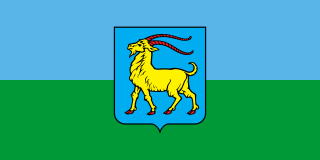
Istria is the largest peninsula within the Adriatic Sea. Located at the top of the Adriatic between the Gulf of Trieste and the Kvarner Gulf, the peninsula is shared by three countries: Croatia, Slovenia, and Italy, 90% of its area being part of Croatia. Most of Croatian Istria is part of Istria County.

The Social Democratic Party of Croatia is a social democratic political party in Croatia. The SDP is anti-fascist, progressive, and strongly pro-European. The SDP was formed in 1990 as the successor of the League of Communists of Croatia, the Croatian branch of the League of Communists of Yugoslavia, which had governed Croatia within the Socialist Federal Republic of Yugoslavia since World War II.
The Istrian Democratic Assembly is a centre to centre-left, regionalist, liberal political party in Croatia primarily operating in Istria County.
This article gives an overview of liberalism in Croatia. Liberals became active since 1860 in Dalmatia and since 1904 in the rest of Croatia. It never became a major political party. It is limited to liberal parties with substantial support, mainly proved by having had a representation in parliament. The sign ⇒ denotes another party in that scheme. For inclusion in this scheme it isn't necessary so that parties labeled themselves as a liberal party.

The Istrian Coarse-haired Hound is a dog breed from Croatia. It is a rough-coated scent hound still kept primarily as a hunting dog rather than as a pet.

The Istarski mih or Istrian mih is a bagpipe native to the regions of Istria and Kvarner, Croatia.

Kršan is a village and municipality in the eastern part of Istria County, Croatia.
The Left of Croatia was a marginal leftist Croatian political party with no parliamentary representation.
The Diet of Istria was the regional parliament of the Margravate of Istria within the Austrian Littoral of the Austro-Hungarian Empire. It was founded in 1861 and based in Poreč.

Damir Kajin is a Croatian politician.

The Istrian Short-haired Hound is a breed of dog from Istria in Croatia, descended from a very old type of scenthound. This hound is the slightly smaller counterpart to the longer-coated Istrian Coarse-haired Hound from the same region.
The Liberal South East European Network (LIBSEEN) is a South East Europe an alliance of liberal parties and think tanks in the region, founded in Skopje, North Macedonia, in 2008. Its main initiative is to gather liberal parties of Southeastern Europe together and implement liberal policies in their respective countries. Most member organizations of LIBSEEN are also members of Alliance of Liberals and Democrats for Europe Party (ALDE).

Ivan Jakovčić is a Croatian politician who served as prefect of Istria County from 2001 to 2013.

Istrian Italians are an ethnic group from the Adriatic region of Istria in modern northwestern Croatia and southwestern Slovenia. Istrian Italians descend from the original Latinized population of Roman Histria, from the Venetian-speaking settlers who colonized the region during the time of the Republic of Venice, and from the local Croatian people who culturally assimilated.

The Istrian Demarcation or Istrian Perambulation is a legal document on the demarcation of territories between neighbouring municipalities in Istria, currently shared by Croatia, Slovenia, and Italy. More precisely, between the possessions of the Patriarchate of Aquileia, the Count of Gorica and Pazin and the representatives of the Venetian Republic. In addition to the borders that were being agreed upon only in disputed parts of Istria, the Istrian Demarcation also established the payment of fees for the use of forests, vineyards and pastures.

The 119th Brigade, was a Croatian Army guards brigade formed on 7 September 1991 in Pula, western Croatia, with personnel from the former Territorial Defense Brigade Joakim Rakovac. It is, together with the 1st Home Guard Battalion Pula and the 154th Brigade HV, one of the military units from Istria drafted for the Croatian War of Independence. During the Croatian War of Independence, the 119th Brigade primarily operated in the areas of Glibodol, Saborsko, Plitvice, Rakovica, Tržačka Raštela, as well as Slavonia and Dubrovnik.

Luciano Delbianco was a Croatian electrical engineer, musician and politician who served two nonconsecutive terms as Mayor of Pula.

Tone Peruško, was a Croatian educator, social worker and writer.

Istrian identity, also known as Istrianity, Istrianism or Istrianness, is the regionalist identity developed by the inhabitants of the part of Istria located in Croatia. Istria is the biggest peninsula in the Adriatic Sea and a multiethnic region divided between Croatia, Italy and Slovenia. Italians and Slovenes live in both the Italian and Slovene parts, while in the Croatian part, there are Croats, Italians, Istro-Romanians and Istriot-speakers, as well as some non-native minorities. Most of Croatian Istria is located in the Istria County of the country. Istria is the region of Croatia where regionalist sentiment is the strongest.












